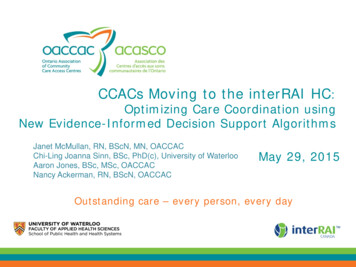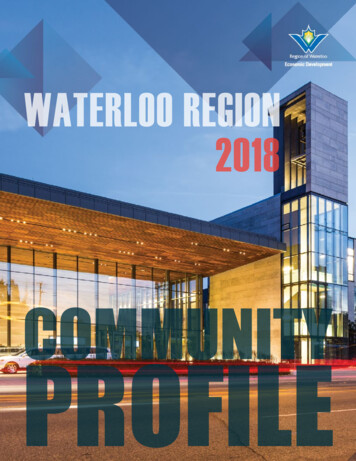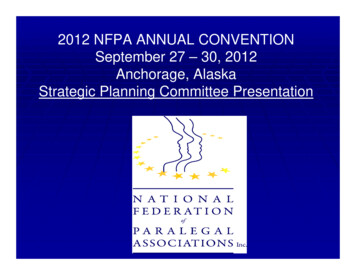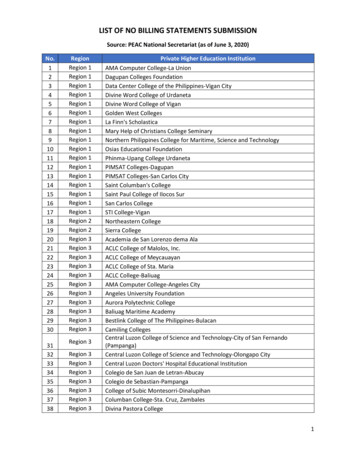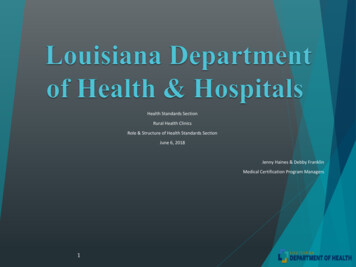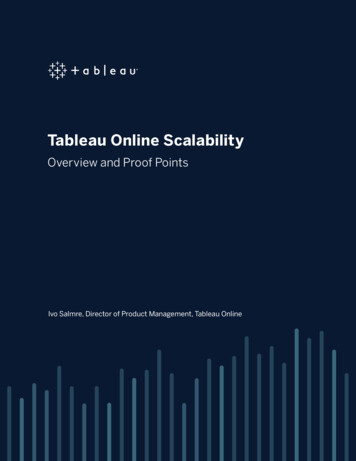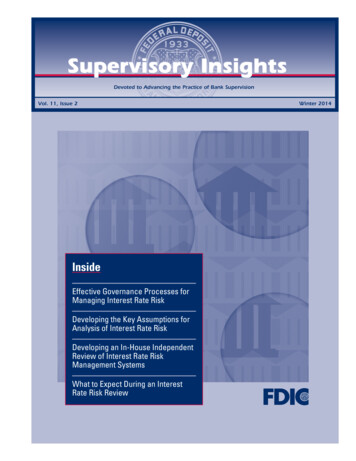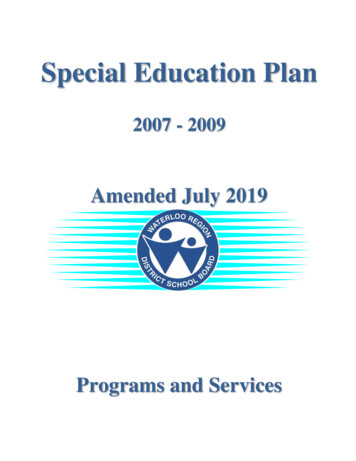
Transcription
Special Education Plan2007 - 2009Amended July 2019Programs and Services
Waterloo Region District School Board51 Ardelt AvenueKitchener, ON N2C 2R5Telephone: 519-570-0003Fax: 519-742-1364 (Board Office)Fax: 519-570-2038 (Special Education Services)www.wrdsb.on.ca
Waterloo Region District School BoardSpecial Education Plan – 2018-2019Table of ContentsIntroduction iAcknowledgements iiSpecial Education Plan Committee .iiWaterloo Region District School Board . .iiiSection 1The Board’s Special Education Consultation Process 1-1Special Education Programs and ServicesSection 2The Board’s General Model for Special Education .2-1Section 3Roles and Responsibilities 3-1Section 4Early Identification Procedures and Intervention Strategies 4-1Section 5The Identification, Placement and Review Process and Appeals Appendix 5-A,A Parent Guide: Understanding the IPRC Process . .5-15-A-1Section 6Educational and Other Assessments 6-1Section 7Specialized Health Support Services in School Settings Appendix 7-A,Specialized Health Support Services .Appendix 7-B,Community Care Access Center School Health Support Services .Appendix 7-C,External Student Service Provider Protocol .7-1Section 8Categories and Definitions of Exceptionalities 7-A-17-B-17-C-18-1
Section 9Special Education Placements Provided by the Board Appendix 9-A,Accommodating Students and Modifying Program Appendix 9-B,Special Education Placements Provided by the Board .Appendix 9-C,Range of Placement Options for Each Categoryof Exceptionality .Appendix 9-D,Care, Treatment, Custodial andCorrectional, Programs and Services . 9-19-A-19-B-19-C-19-D-1Section 10Individual Education Plans (IEPs)/Transition Planning .10-1Appendix 10-A,Form: Individual Education Plan 10-A-1Section 11Provincial and Demonstration Schools in Ontario .11-1Section 12Special Education Staff .12-1Section 13Staff Development .13-1Section 14Equipment .14-1Section 15Accessibility of School Buildings/Accessibility (AODA) . 15-1Appendix 15-A,Accessibility (AODA) 15-A-1Section 16Transportation 16-1Section 17The Board’s Special Education Advisory Committee (SEAC) .Appendix 17-A,SEAC Year-at-a-Glance Appendix 17-B,SEAC Membership 2017-2018 17-117-A-1Section 18Co-ordination of Services with Other Ministries or Agencies 18-1Section 19Forward Thinking . 19-1Elementary and Secondary Schools (alphabetical listing) 20-1Glossary 21-117-B-1
Waterloo Region District School BoardSpecial Education Plan – 2018-2019IntroductionWelcome to this informative and forward-looking overview of special education in the WaterlooRegion District School Board.This document will: assist families that have children with special needs; serve as a reference guide for school and central board staff; inform the Ministry of Education regarding the board’s activities in special education; help the board to improve its delivery of programs and services to students with specialneeds.We hope that you will find it to be ‘user-friendly’ and that it provides you with the answers toyour questions about the delivery of special education services at the Waterloo Region DistrictSchool Board.Special Education Plan, Programs and Services, 2018-2019 is written toinform the Ministry of Education and the public about special education programsand services that are provided by the board in accordance with legislation andministry policy on special education. It is also a forward-looking documentthat outlines initiatives that can be undertaken to continue our efforts to improvethe quality of our special education programs and services.Special Education Programs and Services (Regulation 306 under the Education Act) and theMinistry of Education’s policy document, Standards for School Boards’ Special Education Plans2000 set out the criteria for the board’s special education plan.This plan follows therequirements set out in these documents.It will be reviewed annually and amended, asnecessary, to meet the current needs of our exceptional students. Amendments will be submittedto the Minister of Education for review.For ease of general use and for comparison with the new standards, this document isorganized in sections as they are outlined in the standards. Each section begins with theministry stated purpose for the section. The information provided within each sectionspeaks to the requirements of the standard for the section. To make related informationeasily accessible, any appendices generated by a section are included at the end of thesection, rather than at the end of the entire document. While the use of specializedlanguage has been reduced to a minimum, a glossary of terms used in the writing of thisdocument is provided to assist the reader.WRDSB, Special Education Plani
The current version of the plan will be available on the board’s website in September 2019 pecial-education-plan.Representatives of other ministries, community agencies and partner organizations will be madeaware of its existence and the procedure to obtain a copy.Comments, questions and suggestions are welcome. They may be addressed to: Trustees of the Waterloo Region District School Board, Director and Secretary of the board, Superintendent of Achievement and Well-Being, who is responsible for specialeducation programs and services, System Administrator, Special EducationAcknowledgementsThe Ministry’s policy document, Standards for School Board’s Special Education Plans, 2000,presented the opportunity to substantially revise the content and format of the board’s specialeducation plan. While the completion of previous special education plans has always required asubstantial amount of time and effort, the adjustments undertaken to produce this plannecessitated the application of additional staff time and effort.Under the direction of theSuperintendent of Learning Services with responsibility for Special Education, a committee ofspecial education services staff and volunteers from the board’s Special Education AdvisoryCommittee (SEAC) assumed responsibility for this task. The direct work done by the committeemembers could not have been accomplished without the contributions of many special educationservices staff, in-school staff, other members of SEAC, representatives of community agenciesand other partner organizations, and parents.Special Education Plan Committee2003-2005Cheryl BoyesDawn ClellandBrenda Cox (Chair)Lynette EuletteKaren HiebertSusan LawtonLaurie MenardLisa MulvihillRiza RazackTherese ThompsonCindy WatsonWRDSB, Special Education PlanPsychological Services ConsultantSEAC MemberVice-Principal, Special EducationChief PsychologistSpecial Education ConsultantSpeech and Language ConsultantSpecial Education ConsultantPsychological Services ConsultantSpecial Education ConsultantSEAC ChairTrusteeii
Waterloo Region District School BoardInnovating Tomorrow by Educating TodayThe following three Strategic Priorities were developed by the Waterloo Region DistrictSchool Board in 2016:Our students are first – each and every one.Our staff, families, and caregivers are partners in everystudent’s learning.Our culture of innovation builds students’ confidence andsuccess as they face the future.WRDSB, Special Education Planiii
The Waterloo Region District School Board is one of the larger school boards in Ontarioserving the seven municipalities that make up the Regional Municipality of Waterloo.The board provides a public school system for junior kindergarten to Grade 12 students. It isresponsible for the operation of 16 secondary schools and 104 elementary schools.The 2018-2019 board enrolment is approximately 63,009 students with 44,325 elementarystudents (including care and treatment facilities) and 18,684 secondary students.The board's special education program is founded on the philosophy that every student is entitledto an education in the most beneficial learning environment available. Programs range fromthose that provide support for students in regular classrooms to those offered in congregatedclasses. More than 12,000 students receive some form of special education assistance each year.The board operates a comprehensive French language program throughout the region. CoreFrench is offered from grade one to grade 12. A Partial French Immersion Program is offeredfor a total of 150 minutes per day in grades one to eight. At the secondary level, students canchoose the Immersion French program and pursue eleven courses or Extended French programand pursue seven courses.Alternative education credit programs include: night school; summer school; U Turn; ChoicesSteps to Reengagement; and International Languages programs (credit and non-credit).Vista Hills located in Waterloo, opened September 2016. Groh Public School and Chicopee Hillsopened September 2017. Janet Metcalfe opened September 2018.The Board of TrusteesThe Waterloo Region District School Board has 11 elected members representing the sevenmunicipalities within the Regional Municipality of Waterloo: three members from the City of Cambridge/Township of North Dumfriesfour members from the City of Kitchenerthree members from the City of Waterloo/Township of Wilmotone member from the Township of Wellesley/Township of WoolwichThe board has two student representatives who were selected by the Board-wide Association ofStudent Council Chairs. They take part in discussions and debate during public meetings.It is the board's objective to invite, support and encourage public participation in the policyformulation, delivery and quality assurance of educating our students.The Board's eleven-person elected board of trustees is responsible for approving the policies andbylaws governing the Board's operations. The board of trustees also ensures that the quality ofWRDSB, Special Education Plan4
education in Waterloo Region is maintained and the educational goals and needs of all studentsare met.It is the responsibility of Trustees to attend Committee of the Whole and Board meetings.Committee of the Whole meetings are held on the second and third working Mondays of eachmonth. Board meetings are held on the last working Monday of each month, at which time theboard ratifies the action taken at Committee of the Whole meetings in previous weeks.The board values effective communication with the communities it serves, and encouragesindividuals and groups to appear as delegations at Committee of the Whole and Board Meetingsto present their views.AdministrationThe Director of Education and Secretary is the Chief Executive Officer of the board. TheDirector is the system leader and lead learner encouraging a culture of success, co-operation andcollaboration.The Director leads the Executive Committee comprised of two coordinating Superintendents ofEducation, a Superintendent of Financial Services and Treasurer, and a Superintendent of HumanResources and Organizational Development. This committee is supported by an EducationCouncil that is led by the Superintendent of Education and is comprised of the Superintendent ofLearning Services, Executive Officer and eight Superintendents of Instruction along withprincipal representatives of WREA and SSPA.The principles and premises of learning outcomes are applied to give direction to and to assessthe value of activities at all levels within the board. This process is implemented through aclearly articulated planning process which assesses the current status and describes the preferredfuture and planning actions with clearly defined roles, responsibilities and timelines. Site-basedmanagement is the strategy used to achieve the learning outcomes by enabling staff to makedecisions at the point where they are implemented. Resources of the system are allocated tosupport students' achievements of the learning outcomes. Excellence is expected.Further information about the board’s administration and organization as well as the governancepolicy for the board is available on the board website (www.wrdsb.on.ca).WRDSB, Special Education Plan5
Section 1TheBoard’sSpecialEducationConsultationProcess
Section 1The Board’s Special Education Consultation ProcessThe purpose of this section is to provide details of the board’s consultation process to theministry and to the public.A Description of the Board’s Special Education Consultation ProcessThe board has ongoing representation on various community committees and working groups.Special education services staff also interacts with representatives of a wide variety ofcommunity agencies and partner organizations in the normal course of their work. These forumsprovide additional information on an ongoing basis that contributes to the board’s developmentand delivery of programs and services.The monthly meetings of the board’s Special Education Advisory Committee (SEAC) provideregular opportunities for the representatives of community associations and the public at large toshare their observations and requests regarding programs and services.Information shared by special education services staff at regular meetings provides currentfeedback that is very useful in developing an effective response to the needs presented. Programleaders meet regularly with special education services administrators to share information from avariety of sources and determine how best to respond in a given situation.While all of these input forums contribute to the day-to-day operation of special educationservices, they also help to shape the direction of the board’s special education plan.As members of the board’s Special Education Plan Committee, the chairperson and an agencymember of SEAC assisted in the development of this document.The board is currently dealing with significant change in many areas of its operation, includingspecial education services, e.g., ongoing revisions to the special education funding model,increasing demands on current service delivery, expectations with respect to individual educationplans and revision to the special education plan.Involvement of SEAC in the Annual Review of the Board’s Special Education PlanIn accordance with Regulation 464/97 the Special Education Programs and Special EducationServices 2003-05 plan was presented to SEAC upon its completion. SEAC also had anopportunity again in April 2005 to review the entire 2003-05 document and provided feedbackand direction. SEAC representatives were part of the Special Education Plan review committee,as indicated previously, and helped to develop the current 2005-07 document. In addition, thosesections that reflected significant revision were made available to SEAC in first draft form inMay 2005, for consideration and comment. The complete plan was available to SEAC in June,2005.WRDSB, Special Education Plan1-1
For the 2018-2019 update, SEAC members worked with board staff to review the changes. Theupdate was discussed at a sub-committee meeting in May and amended with feedback followingthat meeting. SEAC reviewed the updated plan at the June SEAC meeting.Majority and/or Minority Reports Concerning the Board’s Approved Plan That Have BeenReceived from Members of the Board’s SEACSEAC as a whole, or individual members of the committee may submit reports about any or allaspects of the boards special education plan. No such reports have been received regarding the2003-05 plan. The board worked with SEAC to review the 2003-05 plan and their feedback hasbeen incorporated into each subsequent updated plan, including the plan for 2018-2019.Distribution of Information Regarding the Timelines and Methods for Providing Input intothe Board’s Special Education PlanThe plan is made available on the board’s website as indicated in the Introduction to thisdocument.Parents are informed via school newsletters regarding the availability of the plan and the date,place and time of any public sessions that are scheduled to review the special education plan ordeal with other aspects of special education. The association members of SEAC can make thistype of information available to their constituents. These groups may schedule opportunities toreview the plan and provide feedback to SEAC and the board through their representatives.Summary of Feedback Received As a Result of Consultation with the CommunityThe board has not received any specific feedback from the community at large regarding theprevious plan. SEAC has provided some input as requested and there has been very positivefeedback received from our Special Education Resource Teachers and administrators. This inputwas gathered in the Gap Analysis Report, April 2005.Internal and External Reviews of Special Education Programs and Services Scheduled for2009-2011The Special Education Review summary may be found special-education-review-final-reportWRDSB, Special Education Plan1-2
Section 2TheBoard’sGeneralModelforSpecialEducationWRDSB, Special Education Plan2-1
Section 2The Board’s General Model for Special EducationIn accordance with its vision statement, Innovation Tomorrow by Educating Today, the boardstrives to provide educational opportunities that encourage all students to develop theirindividual potential in the most enabling environment. When a student’s optimal learningpotential is affected by behavioural, communicative, intellectual or physical exceptionalities,special education support is required.PhilosophyThe Waterloo Region District School Board believes that “every person can learn, has uniqueabilities and needs, and is deserving of respect”. We are very proud of the programs andservices that we offer to meet the diverse needs of each learner.In all areas of exceptionality, the regular classroom in the home school is considered as theplacement of first choice when such a placement meets the needs of the student, is in accordancewith parental wishes, and allows for the continuation of a positive learning environment.However, the board provides a large number of congregated settings for students who willbenefit from them. The programs and services within special education are specifically alignedwith the various exceptionalities and definitions provided by the ministry. Consultative staff hasbeen assigned program leadership to manage support for these programs and services.The Special Education Services model of delivery is within multi-disciplinary teams, whichinclude a Speech and Language Pathologist, a Social Worker, a Psychological ServicesConsultant and a School Liaison Consultant. This multi-disciplinary team meets with eachSchool Based Team, as requested to problem-solve student needs. In consultation with theparents, decisions about program modifications are explored, developed and implemented.Programs and services are designed to meet the individual needs of students through a continuousprocess that includes ongoing assessment, program development and implementation. The boardis committed to using the available resources to provide special education programs and enrichedservices of the highest possible quality.Programs and ServicesThe board has developed a broad range of programs and services for students with special needs.The vast majority of students with special needs are supported in regular classroom settingsthrough modification of curriculum and/or accommodations to the learning environment.Programming for these students may include intervention and support delivered by specialeducation resource teachers assigned to each school, as well as itinerant personnel with expertiseWRDSB, Special Education Plan2-1
in various areas, e.g., speech and language, blind-low vision, behaviour, developmental issues,orthopedic and enrichment.If students require more intensive assistance, intervention may include withdrawal from theregular classroom to a small group or individual setting in their home school. When students arechallenged with more profound exceptionalities, the board provides specialized congregatedprograms to respond to their unique learning needs. Since these programs are not available inevery school, the student may be transported to another school.The board’s special education programs and services have been developed in accordance withthe Canadian Charter of Rights and Freedoms, the Ontario Human Rights Code, and theEducation Act and regulations made under the act.WRDSB, Special Education Plan2-2
Section 3RolesandResponsibilities
Section 3Roles and Responsibilities In Special EducationThe purpose of this section is to provide the public with information on roles and responsibilitiesin the area of special education.The ministry provided most of the following information about roles and responsibilities in thearea of special education. An * indicates where additions and/or adjustments have been madethat are specific to the board.The Ministry of Education: defines, through the Education Act, regulations, and policy/program memoranda, thelegal obligations of school boards regarding the provision of special education programsand services, and prescribes the categories and definitions of exceptionality; ensures that school boards provide appropriate special education programs and servicesfor their exceptional students; establishes the funding for special education through the structure of the funding model.(The model consists of the Foundation Grant, the Special Education Grant, and otherspecial purpose grants.); requires school boards to report on their expenditures for special education; sets province-wide standards for curriculum and reporting of achievement; requires school boards to maintain special education plans, review them annually, andsubmit amendments to the ministry; requires school boards to establish Special Education Advisory Committees (SEACs); establishes Special Education Tribunals to hear disputes between parents and schoolboards regarding the identification and placement of exceptional students; establishes a provincial Advisory Council on Special Education to advise the Minister ofEducation on matters related to special education programs and services; operates Provincial and Demonstration Schools for students who are deaf, blind, or deafblind, or who have severe learning disabilities.The district school board or school authority: establishes school board policy and practices that comply with the Education Act,regulations, and policy/program memoranda; monitors school compliance with the Education Act, regulations, and policy/programmemoranda; requires staff to comply with the Education Act, regulations, and policy/programmemoranda; provides appropriately qualified staff to provide programs and services for theexceptional students of the board; obtains the appropriate funding and reports on the expenditures for special education; develops and maintains a special education plan that is amended from time to time tomeet the current needs of the exceptional students of the board; reviews the plan annually and submits amendments to the Minister of Education;WRDSB, Special Education Plan3-1
provides statistical reports to the ministry as required and as requested;prepares a parent guide to provide parents with information about special educationprograms, services, and procedures;establishes one or more Identification, Placement and Review Committees (IPRCs) toidentify exceptional students and determine appropriate placements for them;establishes a Special Education Advisory Committee;provides professional development to staff on special education.The Special Education Advisory Committee (SEAC): makes recommendations to the board with respect to any matter affecting theestablishment, development, and delivery of special education programs and services forexceptional students of the board; participates in the board’s annual review of its special education plan; participates in the board’s annual budget process as it relates to special education; reviews the financial statements of the board as they relate to special education; provides information to parents, as requested.Further information regarding SEAC is available in Section 17, The Board’s Special EducationAdvisory Committee (SEAC).The school principal: carries out duties as outlined in the Education Act, regulations, and policy/programmemoranda, and through board policies; communicates Ministry of Education and school board expectations to staff; ensures that appropriately qualified staff are assigned to teach special education classes; communicates board policies and procedures about special education to staff, students,and parents; ensures that the identification and placement of exceptional students, through an IPRC, isdone according to the procedures outlined in the Education Act, regulations, and boardpolicies; consults with parents and with school board staff to determine the most appropriateprogram for exceptional students; ensures the development, implementation, and review of a student’s Individual EducationPlan (IEP), including a transition plan, according to provincial requirements; ensures that parents are consulted in the development of their child’s IEP and that theyare provided with a copy of the IEP; ensures the delivery of the program as set out in the IEP; ensures that appropriate assessments are requested if necessary and that parental consentis obtained.The teacher: carries out duties as outlined in the Education Act, regulations, and policy/ programmemoranda; follows board policies and procedures regarding special education; maintains up-to-date knowledge of special education practices;WRDSB, Special Education Plan3-2
where appropriate, works with special education staff and parents to develop the IEP foran exceptional student;provides the program for the exceptional student in the regular class, as outlined in theIEP;communicates the student’s progress to parents;works with other school board staff to review and update the student’s IEP.*The special education resource teacher (SERT), in addition to the responsibilities listedabove under “the teacher”: holds qualifications, in accordance with Regulation 298, to teach special education; provides special education students and classroom teachers with program and assessmentsupport to promote opportunities for academic success; plans and implements instructional programs, IEPs and educational assessments; co-ordinates IPRC meetings and performs associated administrative duties; collaborates with teachers, parents and support personnel to determine appropriateaccommodations for student learning and necessary modifications made to programs aswell as communicating assessment results; monitors, with reference to the IEP, identified individual students regarding program,placement and support structures; facilitates student transition to and from new programs and placements.*The congregated program teacher, in addition to the responsibilities listed above under “theteacher”: holds qualifications in accordance with Regulation 298, to teach special education; provides full educational classroom experience for a specific number of students whohave been identified as exceptional in one or more of several areas; provides input to school staff, parents, support staff and representatives of communityagencies, as appropriate, regarding the needs of students in order to maximize theeffectiveness of programs; designs and implements IEPs; co-ordinates IPRC meetings or case conferences as required; facilitates the integration of students wherever possible to promote a broad educationalexperience; supports the transition of students through the system and into the community; supervises and works with educational assistants to provide program support for students.*The itinerant special education teacher: holds qualifications, in accordance with Regulation 298, to teach special education andhas demonstrated expertise working with students with a particular exceptionality; provides a range of support services, from direct service to consultation with students,school personnel, parents and representatives from community support agencies; creates and/or adapts individualized programs to address the needs of exceptionalstudents; works with school personnel to facilitate the identification of exceptional students; collaborates with classroom teachers and special education teachers in the planning,implementation and evaluation of differentiated programs;WRDSB, Special Education Plan3-3
assists with the development of the IEP and may participate in IPRC meetings foridentified students.*The special education consultant (school liaison consultant): holds qualifications in accordance with Regulation 298, to teach special education and aSpecialist Certificate in Special Education; is responsible for providing support services to students, school personnel, administrationand parents that range from preventative consultation to direct service to students; provides consultation, management and support for area congregated programs; maintains an awareness of special class placement needs and enrolments; manages the placement of students in congregated classes; conveys information to staff regarding changes in legislation, policy revisions andprocedures affecting the operation of special education services; assumes a leadership role in maintaining awareness of current research and trends inspecial educat
the quality of our special education programs and services. Special Education Programs and Services (Regulation 306 under the Education Act) and the Ministry of Education's policy document, Standards for School Boards' Special Education Plans 2000 set out the criteria for the board's special education plan.
